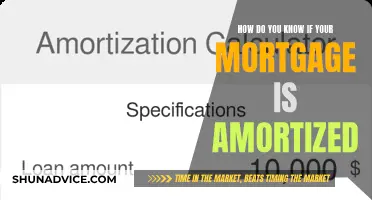
There are several ways to borrow money against the equity in your home. These include a cash-out refinance, a home equity line of credit (HELOC), and a home equity loan. A cash-out refinance replaces your current mortgage with another, bigger loan that includes the balance you owe on your existing mortgage and a portion of your home's equity, withdrawn as cash. A HELOC is similar to a credit card in that you are approved for a set amount but can borrow what you need when you need it, and a home equity loan provides a lump sum of money at closing.
Borrowing Money from Your Mortgage
| Characteristics | Values |
|---|---|
| Type of Loan | Home Equity Loan, Cash-Out Refinance, Home Equity Line of Credit (HELOC) |
| Amount | Up to 80-90% of the home's value, minus what is owed on the mortgage |
| Repayment | Fixed-rate interest over a predetermined term (typically 5-30 years) |
| Eligibility | Based on creditworthiness, income, and appraisal of the home |
| Risk | Home is used as collateral, failure to repay may result in foreclosure |
| Use of Funds | Recommended for expenses that build wealth, such as home improvements or debt repayment |
| Tax Implications | Interest may be tax-deductible if used for specific purposes, such as home improvement |
| Flexibility | Less flexible than HELOC, which offers a revolving balance and more flexibility for ongoing projects |
What You'll Learn

Home equity loans
A home equity loan is a popular choice for homeowners who want to undertake home improvement projects or pay off other debts. It allows you to borrow money using your home as collateral. In other words, you are borrowing against the equity in your home.
Your home equity is the difference between what you owe on your mortgage and the current value of your home or how much money you could get for your home if you sold it. A home equity loan allows you to tap into some of this equity and receive a lump sum payment that you pay back with fixed-rate interest over a predetermined term, typically from five to 30 years. The amount you can borrow depends on several factors, including your income, credit history, and the market value of your home. Most lenders require you to borrow no more than 80-85% of the equity in your home.
There are several benefits to home equity loans. They offer a fixed interest rate, which is often lower than other types of loans, and provide a predictable repayment schedule with regular monthly payments. This makes budgeting easier. Additionally, if you use the loan for home improvements or renovations, the interest may be tax-deductible.
However, it is important to consider the risks as well. Since your home is the collateral for the loan, failure to repay could result in foreclosure and a significant drop in your credit score. Therefore, it is crucial to carefully evaluate your financial situation and consider the pros and cons before taking out a home equity loan.
Understanding Mortgage Amortization: Strategies for Homeowners
You may want to see also

Cash-out refinance
To understand how much equity you have, subtract the amount you owe on your mortgage from the market value of your home. For example, if your home is worth $300,000 and you have $100,000 remaining on your loan, you have $200,000 in equity. Lenders typically allow you to borrow up to 80% of your home's value, so in this case, you could refinance your home for up to $240,000. After subtracting the amount you still owe on your home ($100,000), you could borrow up to $140,000.
It's important to note that cash-out refinancing results in a new mortgage loan with different terms than your original loan. This means you may have a different type of loan, a different interest rate, and a longer or shorter repayment period. You will also need to go through the appraisal and underwriting process again, and pay closing costs and fees, which can range from 2% to 6% of the loan amount.
Cash-out refinancing can be a good option if you want to consolidate debt, fund a major project, or pay for home improvements. It can also be beneficial if you want to take advantage of lower interest rates. However, it's important to carefully consider the pros and cons before committing, as you will be repaying a larger loan with different terms.
Compared to a home equity line of credit (HELOC), cash-out refinancing provides a lump sum payment with fixed-rate interest and a predetermined repayment schedule. On the other hand, HELOCs have variable interest rates and typically have lower or no closing costs.
FHA Mortgage Assumption: What You Need to Know
You may want to see also

HELOCs
A home equity line of credit, or HELOC, is a line of credit secured by your home that gives you a revolving credit line to use for large expenses or to consolidate higher-interest-rate debt on other loans. Akin to a giant credit card, the funds can be tapped gradually, on an as-needed basis. Borrowers can take out only what they require and pay interest only on what they use. HELOCs have an interest rate that varies with the prime rate, though some lenders allow you to convert a portion of your HELOC balance to a fixed rate.
To qualify for a HELOC, you need to have available equity in your home, meaning that the amount you owe on your home must be less than the value of your home. You can typically borrow up to 85% of the value of your home minus the amount you owe. A lender will also generally look at your credit score and history, employment history, monthly income, and monthly debts.
Strategies for Managing Multiple Mortgages and Financial Freedom
You may want to see also

Borrowing risks
Borrowing money from your mortgage can be a risky endeavour. Here are some key risks to consider:
Losing Your Home
The most significant risk when borrowing against your mortgage is the possibility of losing your home. Both home equity loans and mortgages are forms of secured loans, where your home serves as collateral. This means that if you fail to make your payments and default on the loan, the lender has the right to seize and sell your home to recoup their losses. This process is known as foreclosure and can have severe consequences, including losing your home and damaging your credit score.
Interest Rates and Fees
When borrowing money, it's essential to consider the interest rates and fees associated with the loan. Interest rates can significantly increase the total amount you have to repay, making it more challenging to manage your repayments. Additionally, lenders may charge administrative fees and other expenses, adding to the overall cost of the loan.
Impact on Credit Score
Falling behind on loan payments can negatively affect your credit score. Late or missed payments are reported to credit bureaus and can remain on your credit report for several years. This can make it more difficult to obtain loans or credit cards in the future and may even impact your ability to rent an apartment or qualify for certain jobs.
Unforeseen Circumstances
Life is unpredictable, and unforeseen events can affect your ability to repay the loan. Illness, job loss, or other financial emergencies can strain your finances and make it challenging to keep up with your repayments. It's important to have a plan in place to manage these potential risks.
Debt Burden
Taking on more debt than you can afford can lead to serious financial problems. Before borrowing against your mortgage, carefully consider your ability to repay the loan over the long term. Assess your financial situation, including your income, expenses, and other financial commitments, to ensure you can comfortably manage the additional debt.
Wall Street's Mortgage Business: How It Works
You may want to see also

Tax benefits
Borrowing money against the equity in your home can have certain tax benefits. This is known as tax-aware borrowing, and it can help minimise your tax liability. Here are some key points to consider:
Interest Deductions
One significant advantage is the potential to deduct interest expenses from your taxes. When you borrow against your mortgage, the interest you pay on the loan may be tax-deductible under certain conditions. This applies to both home equity loans and lines of credit (HELOCs). The deduction is generally allowed if the funds are used to "buy, build, or substantially improve" your primary or secondary home, not a rental or investment property. It's important to note that you must itemize deductions on your tax return to take advantage of this benefit.
Loan Purpose
The tax benefits of borrowing against your mortgage are closely tied to how you use the funds. If you use the borrowed money for home improvements or renovations, the interest may become tax-deductible. This can be particularly beneficial if you have high-interest debt, as consolidating it with a home equity loan can provide fixed monthly payments and potentially lower interest rates.
Borrowing Strategies
To maximise tax-aware borrowing, individuals can develop a borrowing strategy. This involves being intentional about how and when they borrow to increase the amount of interest they can deduct. For example, if you borrow to finance the purchase of a residence, you can only deduct interest on up to a certain amount of mortgage debt. However, if you take out a separate loan against the home and invest it in taxable securities, the entire carrying cost of the loan may be deductible as an investment interest expense without a cap.
Limitations and Considerations
While tax-aware borrowing can provide benefits, it's important to remember that your home serves as collateral for the loan. Failure to make payments could result in foreclosure and a significant drop in your credit score. Additionally, tax-aware borrowing strategies should be tailored to your personal financial situation, and consulting a financial professional is advisable.
Understanding Mortgage Calculations in Connecticut
You may want to see also
Frequently asked questions
A home equity loan is a loan for a set amount of money that uses the equity you have in your home as collateral. It is a popular choice for homeowners who want to take on some kind of home improvement project.
A home equity loan allows you to borrow against the equity in your home. You can borrow a set amount of money, which you then repay with interest over a predetermined term. The amount you can borrow is based on the equity in your home.
The primary risk of a home equity loan is that your home is backing the debt. This means that if you can't make your payments, you run the risk of foreclosure and losing your home.







